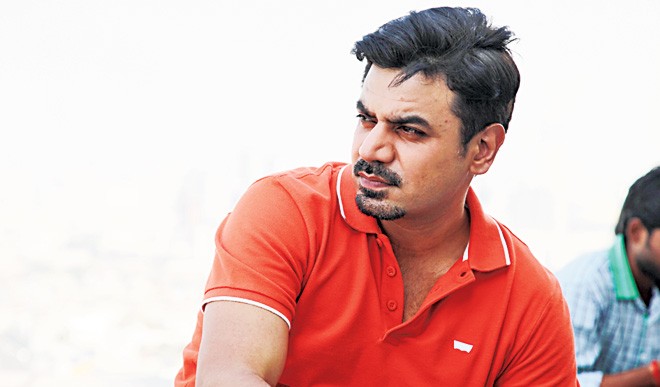
Writer-turned-actor Vasay Chaudhry slams critics on the allegations of copying Bollywood film Masti and reveals the story behind Jawani Phir Nahi Aani’s ‘controversial’ song

It’s safe to say that Jawani Phir Nahi Aani has become the Pakistani film industry’s most popular offering well before its release, and may we say, for all the wrong reasons. On one end there is Hamza Ali Abbasi, one of the film’s leading cast members, who is hell bent on breaking all ties with the film and its promotional campaigns for personal (often perceived as misogynistic reasons). And on the other are the myriad number of claims that deem the film as clichéd and a blatant rip-off of movies like Hangover and Masti. Blame games seem to form the core of JPNA’s current existence and the music isn’t providing much relief either. However, just as most of us don’t agree with the awkward, rather crass dance moves from ‘Fair and Lovely ka Jalwa’, writer Vasay Chaudhry also disagrees with accusations of plagiarism and lack of originality.
"When the teaser came out, people compared it to Hangover. Now when the trailer has been released, everybody is complaining that it looks like Masti and Grand Masti. I’d really like them to first watch the movie before jumping to such conclusions," Vasay asserted while speaking to Instep on the sets of JPNA’s finale song. "This isn’t the first time I’ve written a script. I’ve been doing this for 15 years on television. I’ve done a lot of writing including the entire ‘baraat’ series. Were there any kind of comedic references or jokes that could relate to the kind in Masti? I have never been into that sort of adult humour and so when I haven’t done something like that in 15 years when I had ample opportunity to do so why would I do it at this stage of my career?"
"One should at least consider the names attached to the project - be it me or director Nadeem Baig - and see the kind of work they’ve been associated with. People really need to research before writing such things," he added.
In the media’s defense, the trailer does depict the film as a typical comedy of husbands, tied to their wives’ apron strings, trying to break free from their misery - a storyline we are all too familiar with. In JPNA’s case however, banality in the portrayal of husbands is only part of the problem that may indeed turn out be a misperception. The bigger controversy are the women of the film - those whose entire existence somehow equals their choice of bikinis; rather those whose immodesty seems to be questioning the real-life morality of the men partaking in the film. Vasay pleads innocent while simultaneously pinpointing the lack of common sense that these women, of Western descent, couldn’t possibly be wearing pajamas on a beach.
"There are six songs in the film and out of those six, this is just one song. And in this one song there are four locations on which the song has been shot and out of those four locations, only one is a beach where these women can be seen wearing bikinis. Obviously they couldn’t possibly be wearing ghararas or pajamas while on a beach. So it’s not one song, it is just one location in that one song. In fact we weren’t even aware that there was going to be sequence like ‘the one’ - not until we reached the location and were getting ready to shoot for the song," Vasay clarified. "If I was the director I would’ve taken it out. I wasn’t in favour of Mathira’s item number in Main Hoon Shahid Afridi either but it is the director’s prerogative. The reaction that Mathira’s song received pushed the director to not include an item number in this film. Now with the reaction that the sequence has received, I am sure by the third film something like this won’t be a part either."
Vasay further points out that one cannot restrict creative freedom or control the way one’s mind thinks. A director is fully entitled to add whatever content he or she feels would do justice to the subject of the film or would make better sense - for example ‘expletives’. If the film is a crime caper, the director can most certainly add expletives to a dialogue because what other language would you expect a gangster to speak in. So if the Pakistani mass mentality "demands" that a certain scene should not be shown on screen then is it more the director’s responsibility or the censor board’s? Vasay blames the latter.
"We do play our part as individuals but the censor board also has a responsibility to fulfill. Just like we have police to limit crime, censor board also needs to become a vigilant and assertive authority. They aren’t doing their job right. What are they censoring in an Indian movie apart from anything that is religiously or nationally controversial?" questions Vasay.
Censor board’s role is a dilemma that needs sorting but then so does a celebrity’s social mindset, and by that we mean the many media statements which need to be more socially responsible and less politically incorrect. If a song needs to be edited out on the mere basis of an actress’s look in it – and not the actor’s gawdy floral short, or sherwani for that matter - then why were all the ‘Sheilas’, ‘Munnis’ and ‘Marys’ allowed to let loose without much scrutiny. And if it is too sexist to criticize a Bollywood actress then why is our ‘Billi’ only being discriminated with. It’s just as much a failed case of defining what is moral as it is of an identity conflict. For now, more controversies are only feeding into the film’s publicity and only once it releases will curious souls find out about where it draws inspiration from or whether it even does.